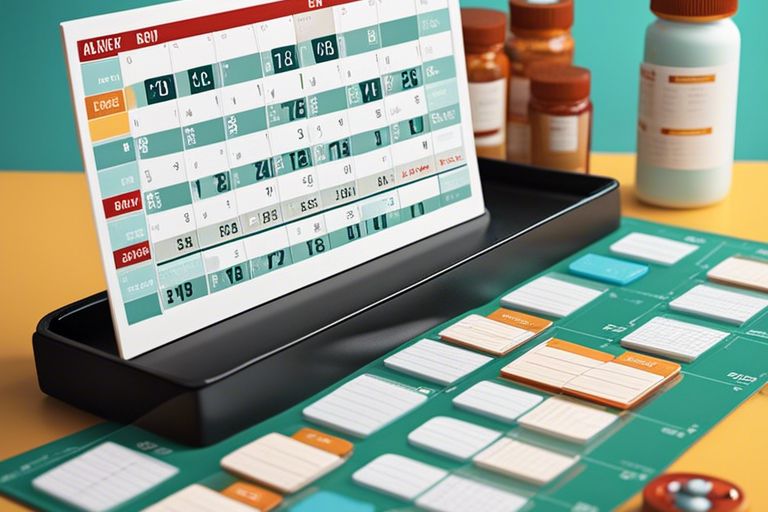
Elderly care requires meticulous attention to medication management. Implementing a structured and efficient medication schedule is crucial to ensure adherence and safety for seniors. In this informative guide, we explore seven of the best medication schedules tailored for elderly individuals. By following these evidence-based recommendations, caregivers can enhance the quality of life and well-being of their elderly loved ones.
Key Takeaways:
- Regular Medication Reviews: It is crucial to conduct regular medication reviews with healthcare providers to ensure the elderly are taking the right medications at the right doses.
- Simple Medication Schedules: Opt for easy-to-follow medication schedules, such as pill organizers or reminder apps, to help seniors stay on track with their medication routines.
- Individualized Approach: Tailor medication schedules to meet the unique needs and preferences of each elderly individual, taking into account their lifestyle and daily routine.
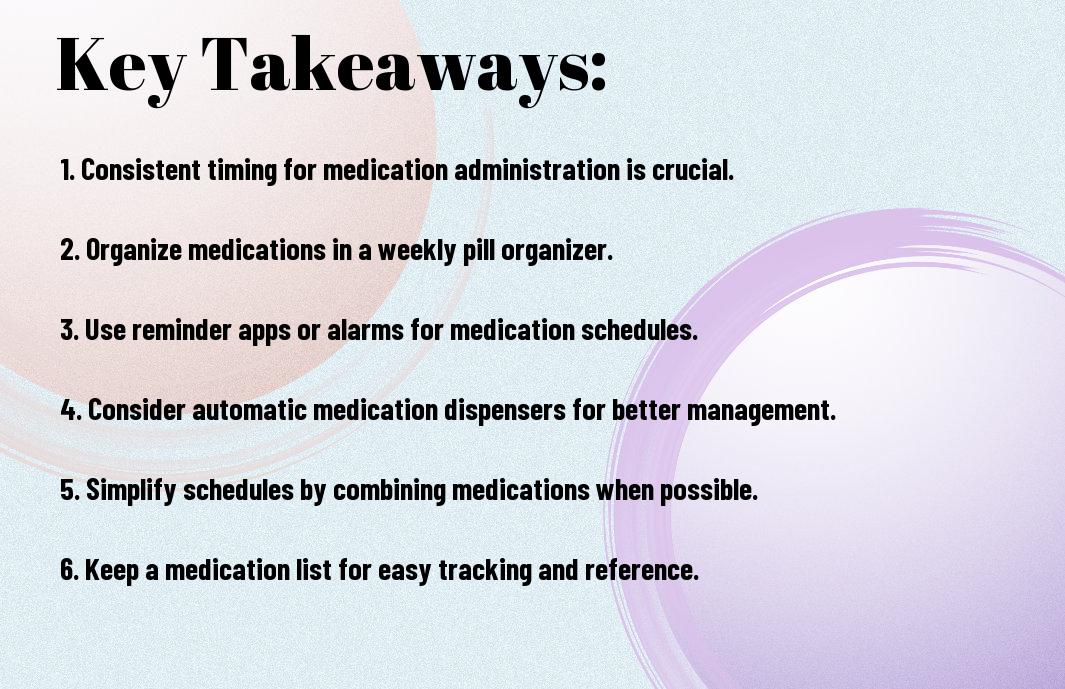
Simplifying Medication Routines
The Importance of Easy-to-Follow Schedules
For elderly individuals, keeping track of multiple medications can be overwhelming. Simplifying medication routines is crucial to ensure they are adhering to their prescribed treatments. By creating easy-to-follow schedules, caregivers can help seniors manage their medications more effectively and reduce the risk of missed doses.
Reducing Medication Errors in Elderly Care
An organized and simplified medication schedule plays a crucial role in reducing medication errors in elderly care. With age, cognitive abilities may decline, making it challenging for seniors to keep track of complex medication regimens. By streamlining the medication routine and labeling pillboxes clearly, caregivers can help prevent confusion and ensure that the right medication is taken at the right time.
The potential consequences of medication errors in elderly care can be severe and life-threatening. Mismanagement of medications can lead to adverse drug interactions, missed doses, or accidental overdoses. Therefore, implementing a simple and organized medication schedule is crucial to safeguard the well-being of elderly individuals.
The Top 7 Medication Schedules for Elderly Care
Any How to Revolutionize Elderly Care: 7 Pill Reminders can make a significant difference in the health and well-being of the elderly. Finding the right medication schedule is crucial to ensuring that seniors take their medications correctly and on time.
Schedule 1: The Morning-Afternoon-Evening Routine
Routine is key when it comes to managing medications for the elderly. This schedule involves organizing medications to be taken in the morning, afternoon, and evening. By following a consistent routine, seniors are less likely to miss doses and can easily remember when to take each medication.
Schedule 2: The Twice-Daily Regimen
To ensure medication compliance, a twice-daily regimen can be highly effective. This schedule involves taking medications only twice a day, simplifying the process for both seniors and caregivers. It’s important to set specific times for each dose to maintain consistency.
A balanced approach is needed when opting for the twice-daily regimen. While it reduces the number of times medication needs to be taken, it requires strict adherence to the dosing schedule to avoid any missed doses.
Schedule 3: The Medication Calendar System
Elderly individuals can benefit from a medication calendar system where medications are organized by day and time. This visual aid helps seniors track their medication intake easily and serves as a reminder for caregivers to refill prescriptions on time.
Another advantage of the medication calendar system is that it helps prevent accidental double dosing by clearly displaying which medications have already been taken.
Schedule 4: The Pill Box Organizer Method
Schedules for seniors can be simplified with the pill box organizer method. By pre-packing medications into compartments for each day of the week, seniors can easily see if they have taken their daily doses. This method reduces the risk of medication errors and helps seniors stay organized.
Schedule 4: The Pill Box Organizer Method provides a visual cue for seniors to manage their medications effectively, promoting independence in their daily routine.
Schedule 5: The Alarm Reminder System
Elderly individuals can benefit from using an alarm reminder system to prompt medication intake. Setting alarms on phones or medication reminder devices can help seniors remember to take their medications at the right time. This schedule is particularly helpful for those who may forget or have difficulty keeping track of their medications.
Understanding the importance of the alarm reminder system is crucial in ensuring that seniors adhere to their medication schedules and maintain their overall health and well-being.
Schedule 6: The Caregiver-Managed Medication Schedule
Any medication regimen can be effectively managed by caregivers who take charge of organizing and administering medications for the elderly. Caregivers should maintain detailed records of medication schedules, including dosages and any special instructions, to ensure seniors receive the correct medications at the right time.
This personalized approach to medication management can provide peace of mind for both seniors and caregivers, knowing that medications are being handled responsibly and in accordance with the prescribed regimen.
Schedule 7: The Customized Medication Plan
On scheduling customized medication plans, healthcare providers work closely with seniors to create personalized medication schedules tailored to their specific needs. This approach takes into account factors such as medication interactions, meal times, and individual preferences, ensuring optimal adherence to the treatment plan.
Schedule 7: The Customized Medication Plan offers a comprehensive strategy for managing medications effectively, promoting better health outcomes and quality of life for the elderly.
Factors to Consider When Choosing a Medication Schedule
To ensure the best medication management for elderly individuals, several factors need to be taken into account when selecting a medication schedule. It is vital to consider the elderly person’s cognitive abilities, the complexity of their medication regimen, and the availability of caregivers or support. By carefully evaluating these factors, you can create a medication schedule that is tailored to meet the specific needs of the elderly individual.
The Elderly Person’s Cognitive Abilities
Schedule medications in a way that aligns with the elderly person’s cognitive abilities. Consider their capacity to remember to take medications at specific times and follow complex medication regimes. If an individual has cognitive impairments, such as dementia, it may be necessary to simplify the medication schedule and provide additional reminders or support.
The Complexity of Their Medication Regimen
One vital factor to consider is the complexity of the medication regimen. Some elderly individuals may require multiple medications at different times throughout the day, making it challenging to adhere to a medication schedule. Assess the number of medications, dosages, and timing requirements to determine the most effective and manageable schedule for the individual.
The use of pill organizers, automated dispensing systems, or synchronized refill services can help simplify the medication regimen and reduce the risk of errors or missed doses. By streamlining the medication schedule, you can enhance medication adherence and promote better health outcomes for the elderly individual.
The Availability of Caregivers or Support
Abilities and resources of caregivers or support systems play a crucial role in maintaining an effective medication schedule for elderly individuals. Consider the availability of family members, home care aides, or healthcare professionals who can assist with medication management. Collaborating with support networks can help ensure that medications are taken as prescribed and that any issues or concerns are addressed promptly.
Assume that with the right medication schedule in place, and adequate support from caregivers, elderly individuals can better manage their medications and improve their overall well-being.
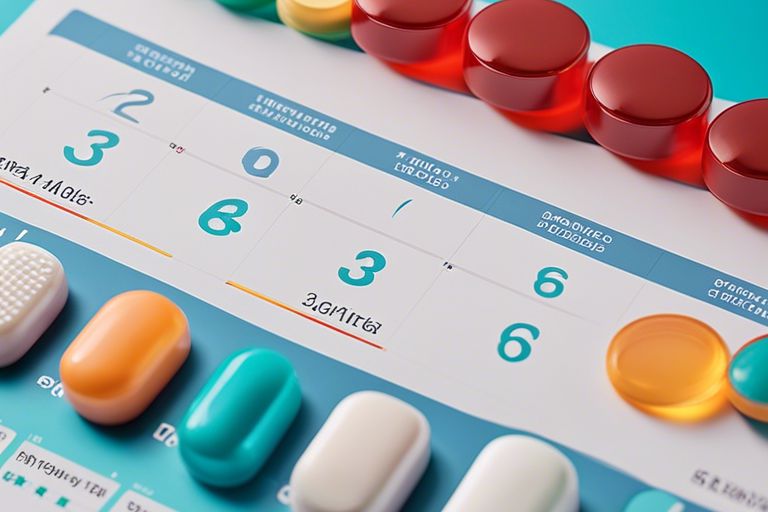
Implementing a Medication Schedule
Many older adults struggle with managing multiple medications, which can lead to missed doses or medication errors. Implementing a medication schedule is crucial for ensuring that the elderly person takes the right medications at the right time.
Educating the Elderly Person and Their Caregivers
The first step in implementing a medication schedule is to educate the elderly person and their caregivers about the importance of taking medications as prescribed. It is crucial to emphasize the risks of missing doses or taking medications incorrectly, and to ensure that everyone involved understands the schedule and why each medication is necessary.
Creating a Medication Schedule Template
Template
Creating a medication schedule template can help simplify the process of organizing and administering medications. A clear and structured template can make it easier for the elderly person and their caregivers to keep track of medications and ensure that all doses are taken on time.
The template should include the names of the medications, dosages, frequencies, and any special instructions. Having a visual representation of the medication schedule can reduce confusion and lessen the likelihood of errors in medication management.
Filling and Managing Pill Boxes or Organizers
Filling
Filling and managing pill boxes or organizers is an effective way to ensure that medications are taken correctly and on time. Dividing medications into separate compartments for each day and time of day can help prevent missed doses and ensure adherence to the medication schedule.
It is important to regularly check and refill pill boxes to avoid running out of medications and to make adjustments as needed. Keeping pill boxes or organizers in a visible and easily accessible place can also serve as a visual reminder for the elderly person to take their medications.
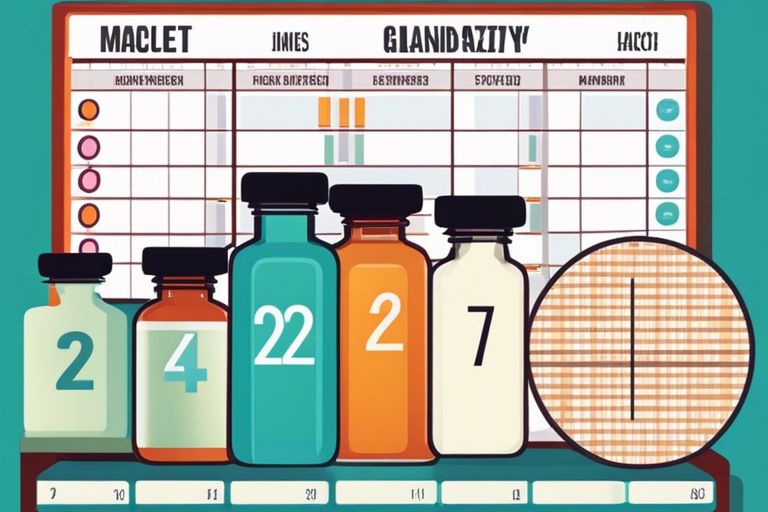
Overcoming Common Challenges
Dealing with Medication Non-Adherence
Not adhering to medication schedules can be a common challenge for the elderly. It’s important to address this issue promptly to ensure the Seniors’ guide to medication management is followed effectively. Any deviation from the prescribed medication routine can lead to health complications or worsening of existing conditions. To overcome non-adherence, caregivers can set up reminders, use pill organizers, and involve family members or healthcare providers to encourage consistency.
Managing Medication Side Effects
Medication side effects are a crucial aspect of elderly care that requires attention. Any changes in seniors’ behavior, physical state, or mood should be closely monitored to identify and address potential side effects promptly. Medication adjustments may be necessary to minimize discomfort and ensure the well-being of the elderly.
Effects of medication can vary from mild to severe, impacting the quality of life for seniors. Caregivers should communicate openly with healthcare providers about observed side effects to explore alternative treatment options or adjustments to the current medication regimen.
Coordinating with Healthcare Providers
Dealing with multiple healthcare providers for elderly medication management can be complex but crucial. A coordinated approach involving primary care physicians, specialists, pharmacists, and other healthcare professionals is important to ensure comprehensive and integrated care for the elderly. It’s important for caregivers to maintain open communication among all healthcare providers to facilitate a holistic approach to medication management.
Monitoring and Adjusting the Medication Schedule
Tracking Medication Adherence and Effectiveness
Adjusting the medication schedule for elderly individuals involves monitoring their adherence to the prescribed medications and assessing the effectiveness of the treatment. It is crucial to keep track of whether the elderly person is taking their medications as directed and if the medications are achieving the desired outcomes.
Identifying Potential Medication Interactions
Effectiveness of the medication schedule also involves identifying potential interactions between different medications. Some medications may interact with each other, leading to reduced effectiveness or unwanted side effects. It is necessary to consult with a healthcare provider to review the medication list and ensure that there are no harmful interactions between drugs.
It’s important to be aware of potential interactions, as some combinations can be hazardous, causing adverse effects that may be harmful to an elderly person’s health.
Making Adjustments to the Medication Schedule
It may be necessary to make adjustments to the medication schedule based on the individual’s response to treatment and any potential interactions detected. Healthcare providers might need to modify dosages, switch medications, or change the timing of doses to optimize the effectiveness of the treatment plan.
Potential adjustments to the medication schedule should always be done under the guidance of a healthcare professional to ensure the safety and well-being of the elderly individual. Regular monitoring and open communication with the healthcare team are necessary to make any necessary changes to the medication regimen.
Final Words
Hence, it is crucial to carefully consider the medication schedule for elderly individuals to ensure their safety and well-being. By following one of the recommended schedules outlined in this article, caregivers can help manage medications more effectively and reduce the risk of errors or missed doses. Bear in mind, open communication with healthcare providers and regular medication reviews are vital to ensure that the medication regimen remains appropriate and effective for the elderly loved ones under your care.
FAQ
Q: What are the benefits of following a medication schedule for elderly care?
A: Following a medication schedule can help ensure that elderly individuals take the right medications at the right time, leading to better health outcomes and improved quality of life.
Q: How can a medication schedule help in managing multiple medications for the elderly?
A: A medication schedule can help prevent medication errors, ensure proper timing and dosages, and assist caregivers in keeping track of multiple medications for the elderly.
Q: What are some common challenges in sticking to a medication schedule for elderly individuals?
A: Some common challenges include forgetfulness, difficulty in swallowing pills, medication side effects, and lack of understanding about the importance of the medication regimen.
Q: How can caregivers help elderly individuals adhere to their medication schedule?
A: Caregivers can help by setting up pill organizers, creating reminder systems, providing emotional support, and communicating effectively with healthcare providers.
Q: Are there different types of medication schedules for elderly care?
A: Yes, there are several medication schedule options, including daily pill organizers, medication reminder apps, medication management services, and customized medication calendars.
Q: How can healthcare providers assist in optimizing medication schedules for elderly patients?
A: Healthcare providers can help by conducting medication reviews, simplifying medication regimens, educating patients about their medications, and addressing any concerns or questions.
Q: What are some tips for creating an effective medication schedule for elderly care?
A: Some tips include organizing medications in a consistent manner, establishing a routine, involving family members in the medication management process, and seeking professional advice when needed.
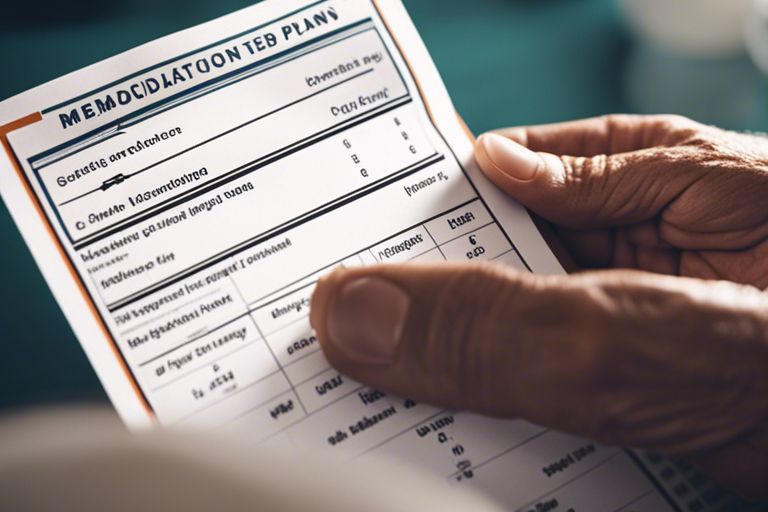

No Comments